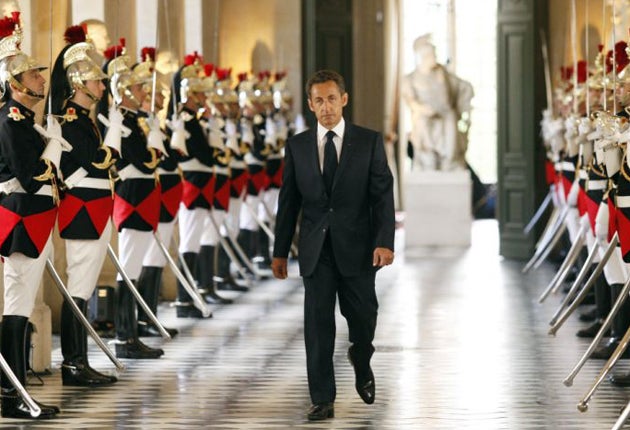Sarkozy's Louis XIV moment
Parliament summoned to Versailles to hear President

Your support helps us to tell the story
From reproductive rights to climate change to Big Tech, The Independent is on the ground when the story is developing. Whether it's investigating the financials of Elon Musk's pro-Trump PAC or producing our latest documentary, 'The A Word', which shines a light on the American women fighting for reproductive rights, we know how important it is to parse out the facts from the messaging.
At such a critical moment in US history, we need reporters on the ground. Your donation allows us to keep sending journalists to speak to both sides of the story.
The Independent is trusted by Americans across the entire political spectrum. And unlike many other quality news outlets, we choose not to lock Americans out of our reporting and analysis with paywalls. We believe quality journalism should be available to everyone, paid for by those who can afford it.
Your support makes all the difference.Nicholas Sarkozy yesterday trod where no French president for 161 years has dared, or chosen, to tread when he spoke to parliament.
After a constitutional change, completed a few hours before, M. Sarkozy addressed both houses of parliament gathered in the Palace of Versailles to explain his vision of the future of France and of the world.
Presidential Question Time it was not. The parliamentarians were forbidden to intervene while the President was speaking. They were forbidden to ask questions. The President's 50-minute speech was followed by a debate but M. Sarkozy departed before it began.
As a result, Green and Communist parliamentarians boycotted the speech. Socialists listened in silence but boycotted the debate. President Sarkozy's centre-right supporters gave him a rhythmic standing ovation.
The whole event – transporting both houses of parliament, the government, the Republican Guard and Carla Bruni-Sarkozy to Versailles – cost the French taxpayer €400,000. One Green deputy suggested that it was "the most expensive press conference in history".
In his speech, President Sarkozy attempted a brilliant balancing act. The man who had been elected two years ago to impose "rupture" on French politics said the global recession had demonstrated that the "French model" was the best in the world. However, he said, this did not mean that "radical" reforms were no longer needed.
Despite the explosion of the indebtedness of the French state, he said there would be no tax rises and no "policy of austerity". Instead there would be a new form of "state loan" – but only for productive investment.
He took a few minutes aside from the macro-politics to address a burning headline issue of the day. The French government is split on whether or not there should be a ban on the burqa, or full-body Islamic veil. President Sarkozy said that the burqa was not a religious symbol but a "symbol of servitude". He supported proposals for a parliamentary inquiry, without saying specifically that he supported a legal ban.
French presidents have been barred constitutionally from addressing parliament since 1875. None has done so since 1848. President Sarkozy pushed through a constitutional change last year, requiring the president to speak to both houses of parliament at least once a year, in the name of "transparency" and the "modernisation" of the French state.
Despite the modesty and humility of these aims, the event rapidly became clothed in monarchical trappings. Satirists and opposition politicians had a field day. President Sarkozy was portrayed by French cartoonists yesterday in the long wig and robes of the absolutist Roi Soleil, King Louis XIV.
President Sarkozy entered the chamber alone, the parliamentarians were forbidden to sit in their political groups. They were seated alphabetically. A debate followed but only after the President had departed. There was no official reply from the Prime Minister, François Fillon.
Opposition politicians and commentators said the event marked the further humiliation of M. Fillon and the prime ministerial office, marginalised by M. Sarkozy's frenetic activity since he became President two years ago.
A lightly reshuffled government – Fillon 2 – will be announced tomorrow. Rather than making wholesale changes, President Sarkozy has decided to do little more than replace two ministers – Rachida Dati (Justice) and Michel Barnier (Agriculture) – who are going to the European Parliament. One government deputy said: "Why bother to reshuffle the government when everyone knows that the real government is the Elysée Palace?"
Burqas and budgets: What he said
In his speech to both houses of the French parliament, President Sarkozy came close to anticipating the result of the planned parliamentary inquiry on the full-length Islamic veil. "The burqa is not welcome on the territory of the [French] Republic," he said.
"The problem of the burqa is not a religious problem. It is a problem of women's liberty and dignity. It is not a religious symbol. It is a symbol of servitude and humiliation."
Among other proposals in his speech, President Sarkozy said that any person made redundant in France should be given one year's salary and training. Despite record borrowing of 7 per cent of GDP, M. Sarkozy said there would be no tax rises or steep spending cuts.
Join our commenting forum
Join thought-provoking conversations, follow other Independent readers and see their replies
Comments